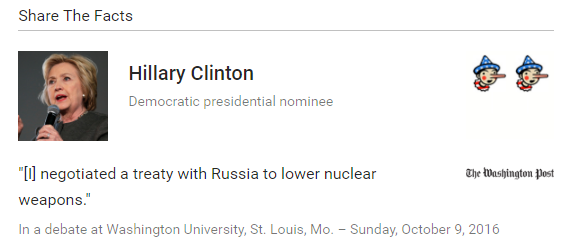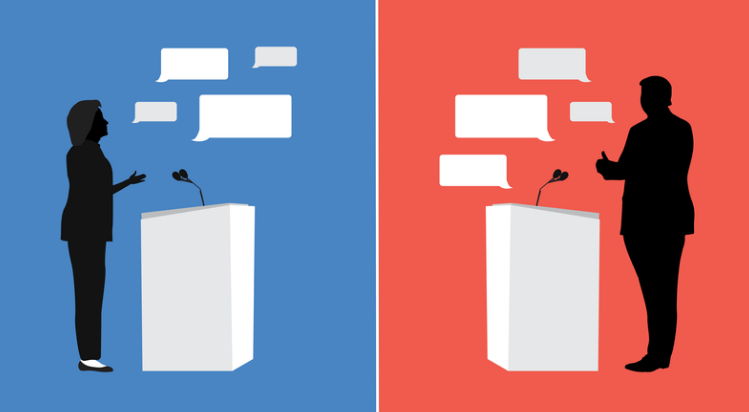
Photo Credit: Meg Kelly/NPR
It’s election season! Who knew, right?
The second presidential debate is now well in the books, accompanied by commentary from TV’s talking heads and every day social media users. While these events are a newscaster’s dream— providing all-day fodder about any and every topic that comes to mind—they are also vital to informing voters on the issues, perhaps being the deciding factor for whom the viewers cast their votes.
Being one of 84 million people who tuned in to the first debate, I’m sure I was not the only person to notice an interesting trend—the prominence of real-time fact-checking on social media and the Internet. This was prompted by Hillary Clinton, who, soon after the debate started, urged viewers to visit her website which was set up to fact check her opponent as the night unfolded. Independent of this request, viewers and organizations took it upon themselves (and their social media accounts) to fact check the debate, too. Below are some notable corrections:
- While on the topic of U.S. jobs disappearing to Mexico and China, Donald Trump cited Ford as an example—it took only minutes for Ford and the United Auto Workers to respond:

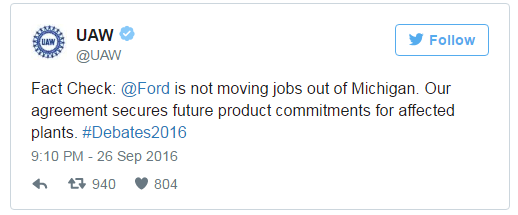
- When discussing murder rates in major cities, Donald Trump claimed that the end to NYC’s stop-and-frisk policy led to a rise in murders, J. Peter Donald, Assistant Commissioner for Communication and Public Information for the NYPD, stepped in within minutes:
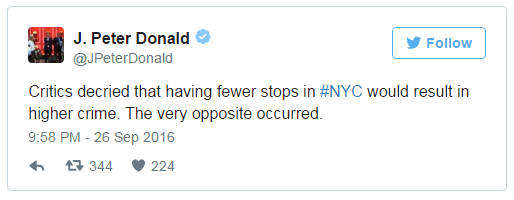
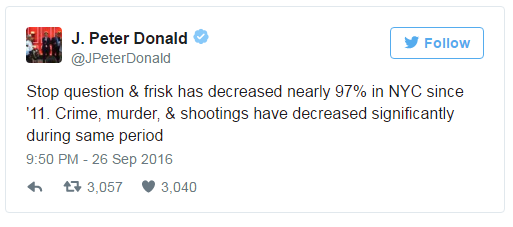
- On limiting Russia’s nuclear program, the Washington Post determined Clinton embellished her claims:
All of the information above appeared online as the debates progressed throughout the night. If you, like me, spent much of the debate on Twitter, you may have come across a lot of this. Engaging with social media in significant, national moments (such as the debates, breaking news or even the Super Bowl) not only allows users to receive an enormous amount of information from a massive user base, it also mixes in personal commentary with fact-based reporting. Just take Twitter’s Moments feature, “the best of what’s happening on Twitter in an instant,” which does exactly that—places its users’ comments alongside respected publications.
As for web traffic, the first debate broke records for NPR’s and Politifact’s websites (both ran a real-time fact-checking tool), which experienced 7.4 million and 2 million page views, respectively. “Literally Trump,” the Clinton campaign’s real-time fact checker, welcomed two million people within an hour of its first mention, and, by the end of that evening, those facts were shared 18,000 times on social media.
The prevalent “he said, she said” theme of the candidates’ campaigns created a monstrous appetite for the truth—something that’s constantly being hurled at us, whether we like it or not. That should make us more informed than ever, right? Maybe not.
Our stream of information has radically changed. The rise of social media over the past decade is obvious, but what’s less clear is how it’s changing our viewpoints. There is a vast amount of information available on countless trending topics, and, appropriately so, it’s easier than ever to curate and customize your flow of information. Thus, it’s simple for users to become mindless, seeing (and believing) only what they agree with and ignoring the rest. Just check out this piece the WSJ wrote, visualizing the differences between a “blue feed” vs. a “red feed”.
The amount of polarization between the two candidates and most of their respective supporters is enormous, and it’s only amplified by the selectivity that exists through many of these avenues on the internet. That being said, with access to the Internet, it’s also easier than ever to be an informed citizen, regardless of what types of publications you choose to read.
The final presidential debate is slated for this Wednesday. If the first two were any indicator, we are in store for much of the same head-shaking, accusation-throwing theme that we’ve grown accustomed to.
And as for fact-checking—it’s a great way to all but force candidates to tell the truth. Right? Well…the jury’s still out on that one.
We are Devine + Partners, communications and content experts who specialize in public relations, issues management, digital communications and content management. Get in touch at resteasy@devinestage.wpengine.com.


